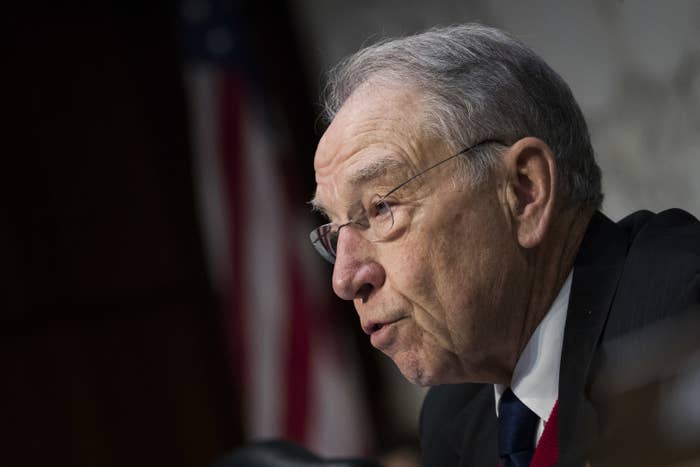
A letter released by two Republican senators takes a new approach to discrediting the Trump-Russia investigation by attacking the credibility of the former British spy who wrote the controversial reports alleging ties between President Donald Trump and the Kremlin.
Sens. Charles Grassley and Lindsey Graham allege that former spy Christopher Steele lied to FBI officials in 2016 when he was giving them information he'd gathered from Russian sources about Trump. Grassley and Graham made the accusation in a newly released letter asking the Justice Department to investigate whether Steele broke federal law by lying to the FBI.
The letter says Steele “materially misled the FBI” by speaking to journalists about his reports — which are known collectively as “the dossier” — after reportedly assuring the FBI he had not done so. Steele’s alleged lying “is relevant to his credibility as a source,” Grassley and Graham said.
The letter represents a new Republican criticism of the Justice investigation and of the FBI’s reliance on Steele’s reports when it asked a judge for permission to monitor former Trump foreign policy adviser Carter Page in October 2016 shortly after Page left the Trump campaign.
Grassley released his letter late Tuesday, one day after a previous Republican effort to discredit the FBI began to dissipate. In that effort, a memo released by House Intelligence Committee Chair Devin Nunes said the FBI failed to tell a judge that the Steele reports were funded by Hillary Clinton’s presidential campaign and the Democratic National Committee.
Nunes released his memo Friday, but it was undermined on Monday when Nunes acknowledged that the FBI had in fact disclosed that the dossier was funded by a political group. Grassley, who is chair of the Senate Judiciary Committee, conceded that point in his letter.
The extent of the FBI’s reliance on Steele’s reports has become a central question dividing Republicans and Democrats. Democrats hope to release a memo this week showing that the FBI relied on sources other than the Steele dossier to show that it suspected Page of being a Russian agent.
In challenging Steele’s credibility, Grassley and Graham are taking a risky approach by seeking to undermine a respected former intelligence officer who had worked with the FBI prior to 2016 and was considered reliable and credible.
In addition, the Grassley-Graham letter does not make fully clear when Steele told the FBI that he was not sharing the dossier with journalists or what Steele told the FBI. And it does not address the fact that Page himself, testifying before the House Intelligence Committee in November, corroborated many of the Steele dossier’s statements about his interactions with Russians in July 2016 when he traveled to Moscow.
“Since Grassley and Graham’s ultimate claim involves concerns about Steele’s credibility, one would have expected them at least to address the subsequent corroboration by Page,” former Defense Department special counsel Ryan Goodman wrote in a blog post today.
Significant portions of the Grassley-Graham letter are redacted, which makes it difficult to follow the contention that Steele lied to the FBI in stating he was not speaking to journalists. The letter states, “Mr. Steele told the FBI he had not shared the Carter Page dossier information beyond his client and the FBI.” But the letter does not state when Steele made that statement to the FBI or what exactly he said.
Steele has acknowledged speaking to reporters about the dossier in the weeks before the 2016 election. Glenn Simpson, whose research group GPS Fusion hired Steele in 2016, also has said that he and Steele spoke about the dossier to reporters from the New York Times, the Washington Post, Yahoo News, the New Yorker, CNN, and Mother Jones, but did not show reporters the actual reports.
The FBI said it stopped talking to Steele in October 2016 — after he had given the FBI information about Page — because of his “unauthorized disclosure of information to the press,” the Grassley-Graham letter says. The FBI said it had admonished Steele “to speak only with the FBI on this matter,” the letter states.
Graham and Grassley had asked for the Justice Department investigation of Steele on Jan. 4. Their eight-page letter was released on Tuesday after a federal review of possible national security and legal issues.

